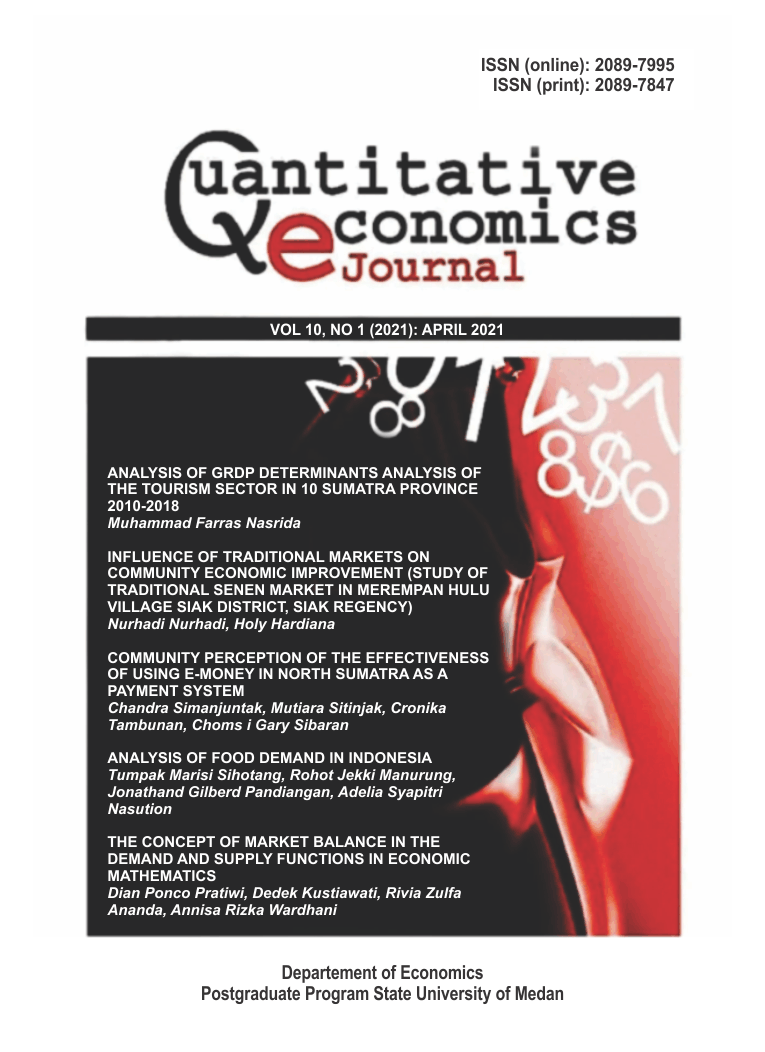COMMUNITY PERCEPTION OF THE EFFECTIVENESS OF USING E-MONEY IN NORTH SUMATRA AS A PAYMENT SYSTEM
DOI:
https://doi.org/10.24114/qej.v10i1.35442Abstract
This E-money is a non-cash payment service. Based on data from Bank Indonesia, North Sumatra representative of digital financial services was able to record transactions worth Rp 346 billion at the end of 2018. For 2019 electronic money transactions in North Sumatra are expected to continue to increase. Seeing this phenomenon, through this research we want to find out how the public perception about the effectiveness of using e-money as a payment system in North Sumatra. Researchers used TAM (Technology Acceptence Model) as the basis for conducting research. This research uses a quantitative descriptive research using primary data by collecting data through 450 questionnaires that have been collected and analyzed to examine hypotheses related to the model. The results of the study indicate that the perception of benefits significantly influences the effectiveness of using e-money with a significance value of 0.00 < 0.05. Perceptions of convenience significantly influence the effectiveness of using e-money with significance values 0.00 < 0.05. Trust has a significant effect on the effectiveness of using e-money with significant value 0.00 < 0.05. And all variables X have a simultaneous effect on the effectiveness of e-money (Y) usage by 70.3%.References
Adi. (2016). Student Perception in Using E-money. JDEB, 131-145.
Women. (2018). The Influence of Perceived Benefits, Perceptions of Ease, Trust and Risk Perceptions on Perceptions of the Use of Electronic Money. Thesis.
Budiani. (2009). The Effectiveness of the Youth Organization's Unemployment Program. Economic and Social Journal.
Davis, FD (1989). Perceived Usefulness, Perceived Ease of Use, and User Acceptance of Information Technology. MIS Quarterly 13(5)
Diptha. (2017). Factors Affecting Employee Satisfaction Levels in Using BCA Flazz Card Electronic Money at Anatara Seminyak Resort Bali. Ejournal of the Department of Economic Education, 1.
Edi, S. (2007). Human Resource Management. Jakarta: Kencana.
Fachruddin. (2016). Influence of Customer Perception on Risk, Trust, Benefit and Ease of Use on Internet Banking usage. Scientific Journal of Accounting Economics Students, 264-276.
Ghozali, I. (2011). Application of Multivariate Analysis with the SPSS 19 IMB Program. Semarang: Undip Publishing Agency.
Hidayati. (2006). E-Money Operational Study. Bank Indonesia.
http://www.antaranews.com/berita/651067/bi-prediction-payment-tol-elektronik-di-sumut-lancar
https://www.bi.go.id/id/statistik/sistempempayan/uangelektronik/Contents/Jumlah%20Uang%20Elektronik.aspx
https://inet.detik.com/business/d-3249623/bank-indonesia-catat-permbuh-pesat-e-money
http://www.medanbisnisdaily.com/news/online/read/2019/04/03/71065/user_uang_elektronik_di_sumut_melonjak_transaksi_rp_346_miliar/
Jugiyanto. (2008). Behavioral Information System. Yogyakarta: ANDI Publisher.
Lemeshow. (1990). Adequacy of Sample Size in Health Studies.
Notoatmodjo. (2010). Health Research Methodology. Jakarta : Rineka Cipta.
Pohan. (2011). Payment System Strategy and Implementation in Indonesia. Jakarta: Rajawali Press.
Rivai, V. (2007). Bank and Financial Institute Management. Jakarta: PT. King Grafindo Persada.
Riyanto. (2011). Health Research Methodology Application. Yogyakarta: Medika. Satries. (2011). The Effectiveness of Youth Empowerment at the Youth Organization of Al Fatih Ibadurrohman Bekasi City. University of Indonesia Postgraduate Student Thesis.
Today. (2016). Analysis of the Effect of Perceived Benefits and Brand Image on Purchase Decisions through Perception of Customer Value as Diponegoro Intervening. Journal of Management, 2.
Subagyo. (2000). Poverty Reduction Effectiveness in Rural Community Empowerment. Yogyakarta: UGM.
Sugiyono. (2007). Business Research Methodology. Jakarta: PT. grammar.
Sugiyono. (2015). Combination research methods. Bandung: Alphabeta.
Sujarweni, W. (2014). SPSS for Research. Yogyakarta: New Press Library.
hero. (2014). E-Commerce Tax Smart Book.












